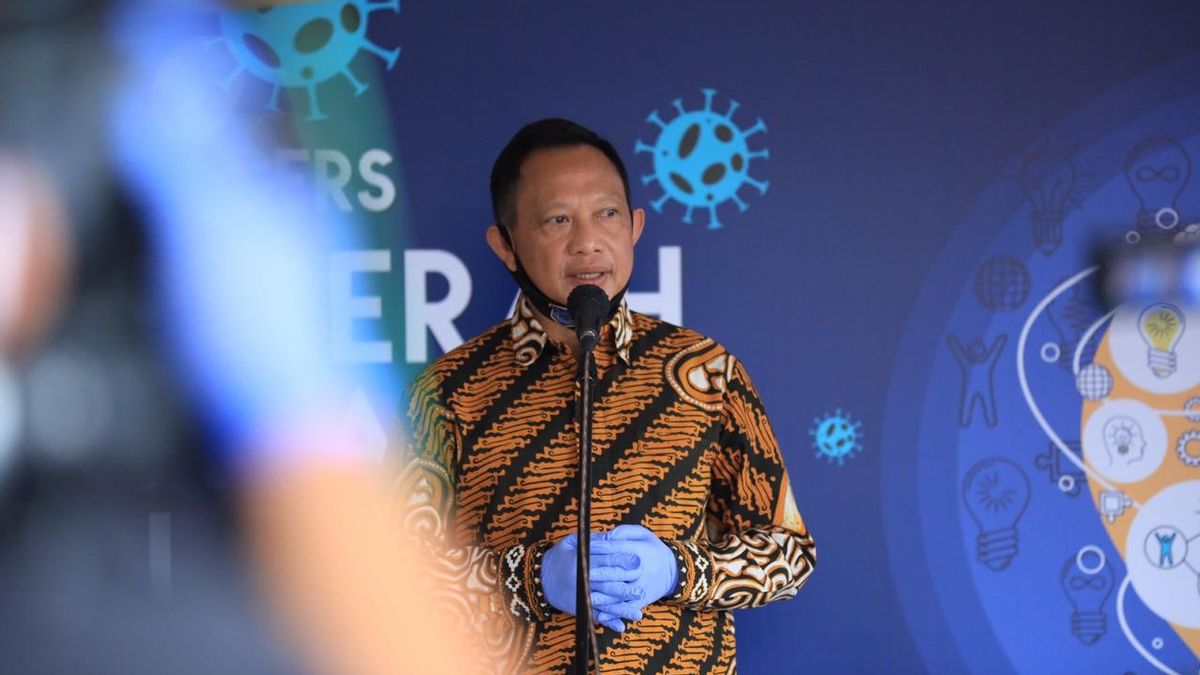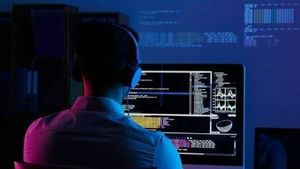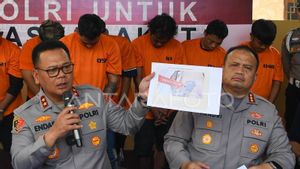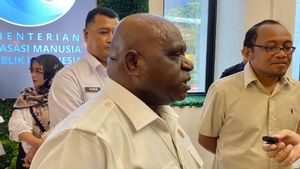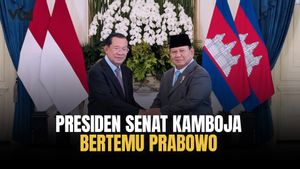JAKARTA - The Ministry of Home Affairs (Kemendagri) is holding a competition entitled 'Regional Innovation in a New Normal Order'. In this competition, local governments were asked to make a simulation video protocol in the new normal phase during the COVID-19 pandemic.
The government disbursed a budget of Rp. 168 billion for the 84 winning regional governments in the form of Regional Incentive Funds (DID). The first winner gets IDR 3 billion, the second winner IDR 2 billion, and the third winner IDR 1 billion.
Various parties criticized this competition. They consider a competition that disburses such a large amount of budget as unnecessary in this era of the COVID-19 pandemic. University of Indonesia Public Policy Researcher Defny Holidin is one of them.
According to him, apart from being unnecessary, this kind of competition was actually dangerous. This is because competitions can make local governments shift their focus from real efforts to combat the spread of COVID-19 to artificial efforts.
"I disagree because the Ministry of Home Affairs initiative could be misleading. In the sense that regional governments can shift their focus from real efforts to combat the spread of COVID-19 to artificial efforts. Which does not necessarily represent the real situation," Defny said when contacted by VOI, Tuesday, June 22.
Epidemiologist from Australia's Griffith University Dicky Budiman also regretted the use of such large funds only to provide prizes for winning regions. According to him, this Rp168 billion prize should be used for other things.
Dicky even questioned, when a region was declared victorious and received a prize according to the competition rules, whether the money would really be used to deal with the pandemic in that region.
Instead of wasting the budget only on competition prizes, Dicky suggested that the budget could be used to increase the procurement of real time polymerase chain reaction (PCR) and reagents.
"So that our testing coverage is increased and maintained," he said.
"In addition, (the funds) can be used to support vaccine or drug research programs in Indonesia," he added.
Moreover, so far, he has not read any references or literature that say competition can be one of the steps to control a pandemic or epidemic.
DPR also criticizedDeputy Chairman of Commission II of the Indonesian Parliament Saan Mustopa questioned the steps of the Minister of Home Affairs Tito Karnavian to hold a video competition for the new normal order in the midst of the COVID-19 pandemic.
"In terms of its benefits, especially in relation to the new normal video competition, what benefits do you want to get? If for example, it turns out that there is no benefit, it is a waste of money. Moreover, we are in a pandemic situation, right?" Saan told reporters.
"It would be better, for example, that such funds are allocated. Moreover, the Minister of Home Affairs now has a big job related to the Pilkada in the midst of a pandemic," he added.
This NasDem Party politician assessed that, rather than for race prizes, these funds should be used as an incentive for handling regional elections in the midst of a pandemic. Mainly, for areas that are still in a dangerous zone.
Saan said that the Minister of Home Affairs should form a team that should be directly deployed to each region. This team, he continued, will assess whether the area is ready for the new normality. This, he said, was more appropriate than making a competition.
"In my opinion, this is not the time to make a competition like that, huh. Better to check it in the field. The Minister of Home Affairs makes a team to check into the field, what is the real situation in areas that are new to normal, rather than through video alone," he said.
Previously, the Ministry of Home Affairs had determined 84 local governments as winners in the competition. According to the Minister of Home Affairs Tito Karnavian, this competition was made as a step to campaign for a new normal phase.
He said, before the winners were selected, 2,517 simulation videos were received by the committee from various local governments. Each video is two minutes long.
In addition to making this video competition, later the Ministry of Home Affairs will also make the competition slap the COVID-19 curve. This competition, he said, had already been discussed with the Head of the Task Force for the Acceleration of Handling COVID-19 and other ministries.
"We discussed earlier with the Head of the Task Force, the Minister of Health, and the Ministry of Finance. We might create another competition, namely a competition for local governments to make the curve possible. This means reducing the spread of COVID-19," said Tito in Jakarta, Monday, June 22. .
Through this competition, the central government will measure which areas can quickly lower the COVID-19 curve over the past month or two. In its implementation, local governments can involve health experts.
So hopefully, areas that are in the red zone of COVID-19 can enter the yellow zone. Likewise, areas that were in the yellow zone can enter the next, safer zone.
"There will be several criteria being assessed. We are first formulating with the Task Force, Ministry of Health, Ministry of Finance for regional incentive funds," said Tito.
With this competition, it is hoped that Tito will be able to foster a competitive climate between regions to prepare for the order of life in a new normal, productive and safe phase of COVID-19.
The winners for 'Regional Innovation in a New Normal Order' are as follows:
A. Provincial Cluster Public Transportation Sector:1. East Java 2. Bali3. Central Kalimantan
City Cluster1. Bengkulu2. Banda Aceh 3. Semarang
Regency Cluster1. Sintang2. Tegal3. North Tapanuli
Disadvantaged District Cluster1. Jayawijaya 2. West Seram3. Sula Islands
B. Provincial Cluster Tourist Sites Sector1. Central Java 2. East Java 3. South Sulawesi
City Cluster1. Semarang 2. Bogor3. Pare-pare
Regency Cluster1. Sintang2. Gunung Kidul 3. Trenggalek
Disadvantaged District Cluster1. Sigi2. Rote Ndao3. West Scary
C. One Stop Provincial Cluster Service Sector1. Central Sulawesi2. North Kalimantan 3. Central Java
City Cluster1. Bekasi2. Bandung3. Surabaya
Regency Cluster1. Trenggalek2. Sinjai3. Situbondo
Disadvantaged District Cluster1. Nias 2. West Seram3. West Sumba
D. Provincial Cluster Hotel Sector1. Jambi 2. North Kalimantan 3. South Sulawesi
City Cluster1. Pekanbaru 2. Surabaya3. Semarang
Regency Cluster1. Trenggalek2. Kebumen3. Sintang
Disadvantaged District Cluster1. Southwest Sumba 2. West Seram3. Tojo Una-una
E. Provincial Cluster Restaurant Sector1. Lampung 2. DI Yogyakarta 3. Jambi
City Cluster1. Bogor 2. Tangerang3. Jambi
Regency Cluster1. Trenggalek2. Tabalong3. Lumajang
Disadvantaged District Cluster1. Southwest Sumba 2. West Sumba 3. West Scary
F. Provincial Cluster Modern Market Sector1. East Java 2. Lampung3. In Yogyakarta
City Cluster1. Bogor 2. Sukabumi3. Semarang
Regency Cluster1. Aceh Tamiang 2. Kebumen3. Tulungagung
Disadvantaged District Cluster1. West Seram2. Belu3. Nias
G. Provincial Cluster Traditional Market Sector1. Bali 2. South Sulawesi 3. Lampung
City Cluster1. Bogor 2. Semarang3. Palembang
Regency Cluster1. Banyumas2. Lumajang3. Semarang
Disadvantaged District Cluster1. Limbata2. West Seram3. West Coast
The English, Chinese, Japanese, Arabic, and French versions are automatically generated by the AI. So there may still be inaccuracies in translating, please always see Indonesian as our main language. (system supported by DigitalSiber.id)
